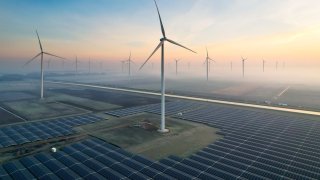
- Explorer and environmentalist Bertrand Piccard estimates that three-quarters of the world's energy goes to waste.
- "If we try to replace fossil [fuel] energy with renewables without being efficient, without reducing the consumption, it's hopeless," he told CNBC.
- Piccard also said it was important to consider the benefits of the current oversupply of solar panels from China.
Explorer and environmentalist Bertrand Piccard has called for a renewed focus on cutting energy waste, saying it's "hopeless" to shift to renewables without improving efficiency.
WATCH ANYTIME FOR FREE
>Stream NBC10 Boston news for free, 24/7, wherever you are. |
Around three-quarters of the world's energy is wasted, Piccard told an "IOT: Powering the Digital Economy" panel moderated by CNBC's Silvia Amaro. This estimate is based on waste "due to inappropriate behaviour and inefficient systems or infrastructures," he told CNBC separately via email.
Piccard, who is founder and chairman of the environmental non-profit organization Solar Impulse Foundation, said that "we live in a world of waste."
Get updates on what's happening in Boston to your inbox. Sign up for our >News Headlines newsletter.
"So if we try to replace fossil [fuel] energy with renewables without being efficient, without reducing the consumption, it's hopeless," he said.
Another issue Piccard highlighted was that some countries only consider wind and solar as alternative renewable energy sources.
Biogas, produced by the breakdown of organic matter such as food, has been "excluded … from the taxonomy" in Europe, he said, and people also forget about geothermal energy, which uses heat from the earth.
Money Report
A report published in October by the European Commission showed that while bioenergy continued to be the main source of renewable energy in the EU in 2021 — at around 60% — biogas made up just 10% of this share. Geothermal energy accounted for just 2.7% of renewable energy consumption, while wind power was 13.2% and solar energy was 7.2%.
"So we focus on producing more, instead of consuming less, and in the production that we want to do, we forget a lot of different types of renewable energies that we don't take into consideration," he said.
As a result of these issues, Piccard said there's a risk that green energy targets could be missed — as well as the opportunity to produce cheaper energy locally.
"So every country wants ... energy independence, more competitiveness, and they forget that the only way to reach it is by energy efficiency, and renewables," he said.
'Paradox' of China's solar panel oversupply
Piccard also discussed the ongoing concerns about the potential oversupply of solar panels from China to the European market.
"It's a bit of a paradox because the Chinese have killed the European solar industry, but they have saved the world by showing that solar energy can be so [much] cheaper than anything else," he said.
There have been growing concerns in Europe and the U.S. that a surplus of subsidized clean energy products, including solar panels, from China is making it more difficult for their domestic industries to compete.
Earlier this month, the European Commission launched two investigations into Chinese solar panel manufacturers that it said could have benefitted from "potentially market distortive" subsidies.
Meanwhile, U.S. Treasury Secretary Janet Yellen said last week that she wouldn't rule out possible tariffs on China's green energy exports.
Piccard said it was also important to consider the potential advantages of Chinese solar panels in Europe, however. For example, he said that these panels could be used to generate cheaper electricity in the region, which could then be used to produce hydrogen locally.
"I think, instead of fighting against the obstacle, I think you need to use the situation to see how there will be outcomes on the side of the problem that can that can be beneficial for us," he said.
Piccard added that when he initiated the Solar Impulse project over 20 years ago, solar energy was 40 times more expensive than it is today. Solar Impulse 2 became the first solar-powered electric airplane to circumnavigate the globe in 2016.
"So I'm sorry, maybe it's not politically correct but I'm thanking China for the decrease [in] price of solar energy that has given a wonderful push to renewable energies — we would not be at this point without China," he said.






